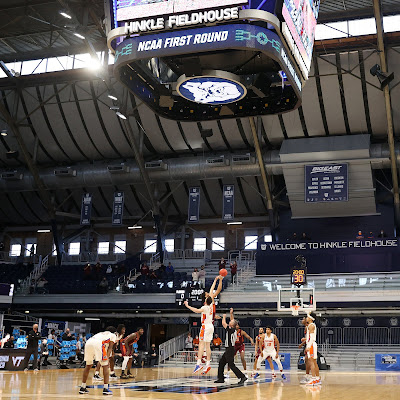No sport has been more negatively impacted by the COVID-19
pandemic than college basketball.
With the NFL season finally about to end, it’s time to
slowly return our attention to college basketball in anticipation of March Madness.
Yes, it’s time for college basketball’s new one-month regular season.
This year, it doesn’t seem like many people care. The
ratings for college basketball games are not terrible but remain low with the
exception of occasional big games, continuing a decade-long downward spiral
that was only temporarily halted by the one-year phenomenon of Zion Williamson.
Still, college basketball faced more of a headwind from COVID-19 than most, as the sport struggles through its 3rd consecutive year
upended by the pandemic.
Other sports, of course, dealt with pandemic-related issues.
Those, though, were minor in comparison. Pro and college football had the
easiest road to haul, with only one season impacted, and the 2021 seasons for
both went off without much issue.
Likewise, MLB had an awful 2020 season followed by a largely
normal 2021 season. The NBA and NHL were forced to finish 2020 in bubbles to
crown champions, but their 2021 seasons ended in front of packed crowds and
rising TV audiences, even if later than normal. This year, both have returned
to normal, and the NBA in particular has seen ratings increase while the NHL
benefits from new TV partners with TNT and ESPN.
Individual sports were barely impacted at all, save the for
the lack of fans until 2021. Golf, for example, thrived during the pandemic due
to the nature of the sport providing excellent social distancing. Auto racing,
particularly Formula 1, saw a boost in interest. Combat sports like boxing and
UFC, as well as pro wrestling, struggled during the early parts of the
pandemic, but found its footing with no crowds and have roared back to life in
the past six months.
That leaves college basketball, and the worst timing ever.
I was in Boston for a work conference when COVID-19 really
started its unfortunate invasion of the United States. I remember flying back
home on a March Sunday night, watching the final of the Mountain West
Conference tournament on the plane. It was played in front of a packed, raucous
crowd. I didn’t realize at the time it would be more than a year until I’d see
a similar scene play out.
The 2020-21 college basketball season was hit hard by the
absolute depths of the pandemic in the winter, with hundreds if not thousands
of games being canceled or postponed. March Madness returned, and we were glad
it did, but it was played in one location in front of very small crowds across
Indianapolis with an odd schedule. Gonzaga and UCLA playing one of the sport’s
greatest games saved the whole thing from total disaster.
This leads us to the 2021-22 season, which was supposed to
be a return to glory for the sport. For a hot minute around Thanksgiving, it
appeared it had. Gonzaga played two tremendous games vs UCLA and Duke that drew
great TV audiences. Maybe the sport was back.
Except so was COVID-19. The omicron variant ran through sports like it did with the country as a whole. While it caused disruptions for
pro sports, with the NHL even shutting down for a week, it really didn’t impact
things too much. The NHL and NBA were in their usual mid-season lull already.
The NFL has enough players on a roster to plow through. College football lost a
couple of minor bowl games, but the fears of bigger issues never materialized.
College basketball, though, did not escape unscathed. So
many teams lost so many players to COVID that we ended up back where we were a
year ago with hundreds upon hundreds of games getting canceled. Teams didn’t
play for weeks at a time. The season lost all rhythm. And unlike the NBA, this
wasn’t a nothing part of the calendar – it was the start of conference play,
when the sport is supposed to hit that next level.
No other sport has had three straight seasons interrupted so
intensely by the pandemic. We cross all fingers and toes that the worst is
behind us because college basketball as a sport needs all the help it can get.
The buzz has been gone for nearly three full years now. Most
big events were lost for one year. We had one NBA Finals or Stanley Cup in a
bubble. We only had one neutral-site World Series. We had one Super Bowl
without a full crowd. We missed one Rose Bowl. We missed one April Masters or
May Indy 500.
But we’ve missed two years of true March Madness. We’ve
missed two years of true conference tournaments. We’ve missed two years of
college basketball reminding so many why they fell in love with the sport
growing up.
It’s almost hard to fathom. March 2019 feels like it took
place seventy years ago. That was the last time college basketball was college basketball. That’s almost three years ago. Few, if any, sports could survive
that type of disruption.
I’m writing this because I’m hopeful. Big Monday kicked off
with Texas Tech and Kansas playing a double overtime classic on Big Monday that
had me staying up near midnight. I didn’t care about either team before the game
started, and I didn’t have money on it. It was merely compelling television.
It’s been too long since college basketball produced that on
a regular basis.
Let’s hope March Madness arrives as it used to in the
pre-pandemic worlds – as a sign that spring has arrived, and things are going
to get better. Lord knows, we need it.


Comments
Post a Comment